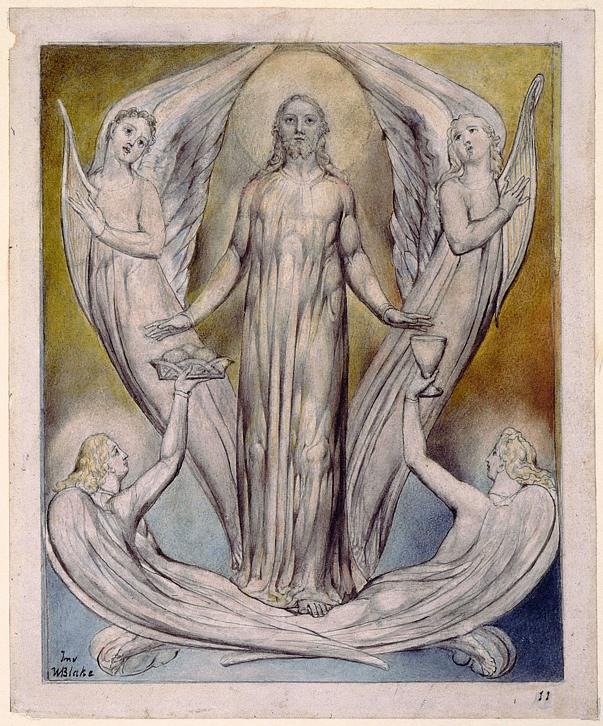William Blake: poet and mystic
By Pierre Berger, Daniel Henry Conner
The authors of this book demonstrate a profound
understanding of the way Blake thought and wrote.
Rarely do we get such a clear description of Blake's
use of symbols to present a world beyond sensation.
This book, published in 1914, can be read online as
a Google Book.
"When the smoke of the incense rises from the altar,
symbolizing the prayers of the congregation, the
priest ...admits the existence of the incense. But
Blake would say: "There is no incense: I see only a
ladder by which angels are carrying our prayers up
to God's throne." And he would see only pity for the
unbeliever who could not see it also. These familiar
symbols will help us to understand Blake's conception
of the visible world. We have only to apply the same
procedure to every case. The world of matter has no
existence of its own: it is only a symbol of the invisible
universe, something shown to us in order that, through
it, we may gain knowledge of what we cannot see.
The earth, the sky, the sun, are all symbols, each at
once a portion and a visible representation, as
delusive as a mirage, of some eternal spirit. Trees,
animals, nay more, even men, are only symbols.
History is a symbol: revolutions are symbols of some
great change actually taking place in the invisible
world. The American Revolution, for instance, merely
symbolized the revolt of the angels of liberty against
the powers of tyranny in the eternal universe.
America itself is only symbol, standing for the part of
the human spirit not yet subjugated and bound down
by tyrannical laws. Blake is a symbol, a mere
transitory form of the prophetic spirit: his wife is a
symbol for the internal joy felt by that spirit, and for
its softer emotions. And so we pass through this little
life of ours, unknowing, unsuspecting that we are but
reflection, metaphors in action, symbols and
representations of eternal beings, who dwell outside
of time and space, and whose life is the only real
existence.
...
It was always from this other point of view that
Blake regarded the world of nature and matter.
Consequently, everything in the visible universe
was an expression of some profounder invisible
existence; and, as a further consequence, no
earthly thing could ever be insignificant."
understanding of the way Blake thought and wrote.
Rarely do we get such a clear description of Blake's
use of symbols to present a world beyond sensation.
This book, published in 1914, can be read online as
a Google Book.
"When the smoke of the incense rises from the altar,
symbolizing the prayers of the congregation, the
priest ...admits the existence of the incense. But
Blake would say: "There is no incense: I see only a
ladder by which angels are carrying our prayers up
to God's throne." And he would see only pity for the
unbeliever who could not see it also. These familiar
symbols will help us to understand Blake's conception
of the visible world. We have only to apply the same
procedure to every case. The world of matter has no
existence of its own: it is only a symbol of the invisible
universe, something shown to us in order that, through
it, we may gain knowledge of what we cannot see.
The earth, the sky, the sun, are all symbols, each at
once a portion and a visible representation, as
delusive as a mirage, of some eternal spirit. Trees,
animals, nay more, even men, are only symbols.
History is a symbol: revolutions are symbols of some
great change actually taking place in the invisible
world. The American Revolution, for instance, merely
symbolized the revolt of the angels of liberty against
the powers of tyranny in the eternal universe.
America itself is only symbol, standing for the part of
the human spirit not yet subjugated and bound down
by tyrannical laws. Blake is a symbol, a mere
transitory form of the prophetic spirit: his wife is a
symbol for the internal joy felt by that spirit, and for
its softer emotions. And so we pass through this little
life of ours, unknowing, unsuspecting that we are but
reflection, metaphors in action, symbols and
representations of eternal beings, who dwell outside
of time and space, and whose life is the only real
existence.
...
It was always from this other point of view that
Blake regarded the world of nature and matter.
Consequently, everything in the visible universe
was an expression of some profounder invisible
existence; and, as a further consequence, no
earthly thing could ever be insignificant."

No comments:
Post a Comment